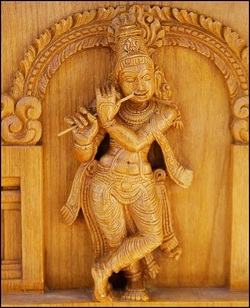Vedic Theology

What is the nature of God, according to Hinduism?
In Vedic or Hindu theology, there is an Absolute Truth or Supreme Being or Original Cause from which everything and everyone emanates. The cosmology of Christianity is relatively miniscule in comparison to Vedic cosmology or theology in regard to the Absolute Truth.
In Hinduism the Absolute Truth is accepted as being both impersonal and personal. There are two schools of thought. The followers of Adi Shankara, also known as Shankaracharya (788 CE - 820 CE), contend that ultimately the Absolute Truth is an impersonal ocean of spiritual light/energy known as Brahman and any personal manifestation of this Absolute Truth is temporary and illusory. The other prominent school of thought is known as Vaishnavism, of which the branches and sub-branches are too numerous to enumerate here. They accept the Vedic conclusion that God/the Absolute Truth eternally exists in both a personal and an impersonal feature and that the impersonal feature is the spiritual effulgence of the personal feature.
All Hindus accept that the universe in which we live is but one of innumerable universes within the material creation and they are all filled with innumerable living beings. The earth is but an infinitesimal part of this material creation and human beings represent a very tiny percentage of the totality of living beings.
Hindus also accept that God has many names. Although God is one entity, there is one Supreme Being or Original Cause, and that Supreme Being has many names according to different characteristics. All names of God used by all religions are names of that same one God.
So in this sense, in the Vedic system God is seen as more powerful or potent than the Christian concept of God being limited. Furthermore, with the Christian concept of God’s form, God is very anthropomorphic. For example, in the Sistine Chapel the painting of God is based on mental speculation. They know God is the most ancient, therefore they have Him with a long hair and beard, etc. But from the Vedic point of view, this is a mistake which is rooted in not understanding the distinction between material energy and spiritual energy. Where there is material energy, flesh and blood, there is birth, disease, old age, and death. There is decay. With the spiritual form of God, however, there is no old age, there is no death, there is no birth.
In Vedic or Hindu theology, there is an Absolute Truth or Supreme Being or Original Cause from which everything and everyone emanates. The cosmology of Christianity is relatively miniscule in comparison to Vedic cosmology or theology in regard to the Absolute Truth.
In Hinduism the Absolute Truth is accepted as being both impersonal and personal. There are two schools of thought. The followers of Adi Shankara, also known as Shankaracharya (788 CE - 820 CE), contend that ultimately the Absolute Truth is an impersonal ocean of spiritual light/energy known as Brahman and any personal manifestation of this Absolute Truth is temporary and illusory. The other prominent school of thought is known as Vaishnavism, of which the branches and sub-branches are too numerous to enumerate here. They accept the Vedic conclusion that God/the Absolute Truth eternally exists in both a personal and an impersonal feature and that the impersonal feature is the spiritual effulgence of the personal feature.
All Hindus accept that the universe in which we live is but one of innumerable universes within the material creation and they are all filled with innumerable living beings. The earth is but an infinitesimal part of this material creation and human beings represent a very tiny percentage of the totality of living beings.
Hindus also accept that God has many names. Although God is one entity, there is one Supreme Being or Original Cause, and that Supreme Being has many names according to different characteristics. All names of God used by all religions are names of that same one God.
So in this sense, in the Vedic system God is seen as more powerful or potent than the Christian concept of God being limited. Furthermore, with the Christian concept of God’s form, God is very anthropomorphic. For example, in the Sistine Chapel the painting of God is based on mental speculation. They know God is the most ancient, therefore they have Him with a long hair and beard, etc. But from the Vedic point of view, this is a mistake which is rooted in not understanding the distinction between material energy and spiritual energy. Where there is material energy, flesh and blood, there is birth, disease, old age, and death. There is decay. With the spiritual form of God, however, there is no old age, there is no death, there is no birth.
Whereas Christianity, Judaism, and Islam are apocalyptic religions, Hinduism and Buddhism are not

Christianity, Judaism, and Islam are all known as apocalyptic religions. Hinduism and Buddhism are not. This is because Hinduism and Buddhism, unlike apocalyptic Abrahamic religions, do not accept the idea that on a particular date the “world will end” and all humans will face a final judgment. Abrahamic religions have a view of reality that can be described as linear, i.e., with a particular beginning and a particular end. There is therefore speculation about when the “world will end.” Over centuries, this has led to many apocalyptic prophets, sects, and cults. Such cult leaders claim that the world is going to end on a certain date, etc.
Such apocalyptic sects do not exist in Hinduism and Buddhism because their philosophy holds that existence is circular with no real beginning or end.
Such apocalyptic sects do not exist in Hinduism and Buddhism because their philosophy holds that existence is circular with no real beginning or end.
Hindus: “Hinduism is not the only way”

Do Hindus believe that theirs is the only path to come to know God?
Most Hindus have great respect for people of all religious faiths because they accept there are many paths a person can follow and be successful.
When Hindus come across the teachings of other religious faiths (for example, teachings of the New Testament or Prophet Mohammad or others), they compare the teachings of that teacher (for example, the New Testament) with the basic teachings of the Vedas. If one finds that the core teachings of a particular religious teacher are consistent with the core teachings, and these teachings are consistent with what one is hearing from within one’s heart, then that teacher or teaching is accepted as legitimate or bona fide.
When the Christian missionary E. Stanley Jones met with Mahatma Gandhi, a Vaishnava Hindu, he asked him, “Mr. Gandhi, though you quote the words of Christ often, why is that you appear to so adamantly reject becoming his follower?” Mahatma Gandhi replied, “Oh, I don’t reject Christ. I love Christ. It’s just that so many of you Christians are so unlike Christ.” Gandhiji was also quoted as saying “…to be a good Hindu also meant that I would be a good Christian. There is no need for me to join your creed to be a believer in the beauty of the teachings of Jesus or try to follow His example.”
Because Hindus believe that the Absolute Truth is not the exclusive property of any individual, group of individuals, faith or religion, Hinduism, as well as Buddhism, are considered to be the most tolerant of all religions.
Most Hindus have great respect for people of all religious faiths because they accept there are many paths a person can follow and be successful.
When Hindus come across the teachings of other religious faiths (for example, teachings of the New Testament or Prophet Mohammad or others), they compare the teachings of that teacher (for example, the New Testament) with the basic teachings of the Vedas. If one finds that the core teachings of a particular religious teacher are consistent with the core teachings, and these teachings are consistent with what one is hearing from within one’s heart, then that teacher or teaching is accepted as legitimate or bona fide.
When the Christian missionary E. Stanley Jones met with Mahatma Gandhi, a Vaishnava Hindu, he asked him, “Mr. Gandhi, though you quote the words of Christ often, why is that you appear to so adamantly reject becoming his follower?” Mahatma Gandhi replied, “Oh, I don’t reject Christ. I love Christ. It’s just that so many of you Christians are so unlike Christ.” Gandhiji was also quoted as saying “…to be a good Hindu also meant that I would be a good Christian. There is no need for me to join your creed to be a believer in the beauty of the teachings of Jesus or try to follow His example.”
Because Hindus believe that the Absolute Truth is not the exclusive property of any individual, group of individuals, faith or religion, Hinduism, as well as Buddhism, are considered to be the most tolerant of all religions.